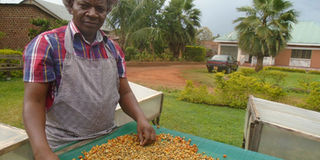Wealth in bitter berries, for your health and pockets

Kato with his sun dried katunkuma at his home. He processes them into powder which he sells at a good price. Photo by Fred Muzaale
What you need to know:
- Trying to get more profit from his farm pushed Jacob Kato into processing his katunkuma. Today, he reaps the benefits. Fred Muzaale studies how Kato rebranded the bitter berries that had fallen behind the times.
Bitter berries, commonly known as katunkuma was regularly eaten as the main sauce in a practice that still exists today in some homes.
However, some people eat it as a side dish because of its health benefits, among them being an immune booster for children and the elderly, who are prone to diseases.
Nonetheless, given its perishability coupled with lack of storage facilities, Jacob Kato a farmer in Kyampisi village, Kayunga Sub-county, Kayunga District, has discovered that drying the vegetable using solar driers lengthens its shelf life while maintaining its nutritional value.
Kato says he learnt about the solar drying technique from fellow farmers in the district, who were carrying out fruit drying. They were using solar driers to dry pineapples, pawpaws, jack fruit and apple bananas.
Kato owns a company called JK Plantations, under which he carries out his work. He carries out farming activities on a four-acre piece of land of which, half an acre is dedicated to bitter berries. He also grows other vegetables like nakati.
His garden is small depending on the amount of bitter berries he needs to process. To sustain his business, he buys from other farmers offering them Shs500 per kilo of fresh katunkuma.
His current production is 300 kilogrammes of raw katunkuma.
He grows the traditional small varieties, which he says are more nutritious than the bigger varieties which are not so bitter.
Kato uses the seeds from ripe katunkuma to start new gardens.
He recalls days when he used to sell his fresh produce to Nakasero Market and Nakawa traders, whom he says were exploiting him. The traders would pay him Shs1,800 per kilo.
However, through farmer trainings on value addition and interactions with fruit farmers, he learnt of possibilities of gaining more from his produce by adding value.
“Since I could have the produce on the market all the time in form of dry katunkuma, I would earn more,” Kato says.
In 2014, he invested about Shs800,000 in buying three small solar driers from a local fabricator, Mr John Naluwayiro, of Patience Pays in Ndeeba village, Kayunga Town, Kayunga District, which he currently uses to add value to the vegetable.
He does not regret anymore.
“I am now my own boss as I can keep my katunkuma for as long as I want without rushing,” Kato says.
How to dry bitter berries
Kato says he picks the mature berries after which he sorts out the bad leaves (those with holes)
He washes them with clean water before boiling them in a saucepan for at least 40 minutes.
When they are cooked, he removes the water and takes them to a solar drier to dry.
Drying takes 2-3 days, when there is good sunshine.
When they are fully dry, he removes them and takes them to a milling machine where he is charged Shs200 per kilo.
The flour is then sieved to remove some hard particles after which it is packed in containers of 200g. He sells a 200g pack for Shs5,000.
When stored under favourable conditions, the packed katunkuma can still be good for consumption for at least one year.
Customers
Kato says he sells his produce to supermarkets in Kampala, Mukono and Jinja.
He adds that sometimes he loses customers because he has not acquired a Q-Mark for his produce. Q-Mark is a product quality certification scheme, which is one of the services to the manufacturing sector.
Under this scheme, UNBS certifies the approved products. Kato says that acquiring a Q-Mark is his target as he wants to export his produce.
But he still enjoys some benefits saying that with a yet to be fully developed marketing network, he sells about 400 packs from which he earns about Shs2.5m monthly. After deducting all the expenses, he remains with about Shs2m.
In a plot of 50x50m he can get about Shs3.5m in two months.
Challenges
His biggest challenge is the dry seasons, when he has to water his vegetables. He says he employs a person to fetch water at Shs300 for a 20-litre jerrycan.
Also, he says pests devour his plants, which leads to losses. This is because he does not use artificial pesticides as he tries to maintain organic farming.
Growing bitter berries
Kato says he sows dry seeds in a seed bed. The soil should be soft and well worked. If it is not a rainy season, he waters the bed. They can do well in fertile and well drained soils. When the seedlings are about one month, he transplants them to the main garden.
The garden should be weed-free for health plants.
After two months in the main garden, the berries can be picked.
Bottom line
According to the National Organic Agricultural Movement, a kilogramme of katunkuma powder is sold at Shs25,000.




